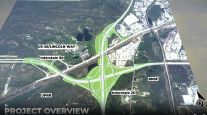All Options Are ‘on the Table’ for Road Fund, Shuster Says
This story appears in the Feb. 4 print edition of Transport Topics.
The new chairman of the House Transportation and Infrastructure Committee said he remains open to any option that can increase the amount of federal funding available for highway projects, including the possibility of raising the federal fuel tax.
In a Jan. 28 interview with Transport Topics, Rep. Bill Shuster (R-Pa.) also said he has created a new panel within the committee to focus on intermodal issues.
“Everything needs to be on the table” regarding funding. “I am not willing to count anything out or count anything in at this point,” Shuster told TT on Jan. 28 after addressing the executive committee of American Trucking Associations earlier in the day.
From the fuel tax and tolling to public-private partnerships and the expansion of a popular funding program known as TIFIA, Shuster said he is “willing to discuss anything.”
He was cautious not to favor any specific path prior to further discussions with federal and state lawmakers, stakeholders such as the trucking industry and the public.
“You can’t just stand up and make the pronouncement you are going to raise them or not going to raise them,” he said of fuel taxes. How to back state projects amid a declining Highway Trust Fund is the funding riddle that must be solved by Shuster, 53, who replaced Rep. John Mica (R-Fla.) as chairman of the committee in January. One possibility, Shuster suggested, may be the approach recently taken by Arkansas.
In November, voters approved a half-cent increase to Arkansas’ 6-cent sales tax to specifically pay for improvements to state-owned roads. It marked the first time the state agreed to use sales-tax revenue for roads.
In order to get on the ballot, the measure first needed approval from the state legislature, which happened earlier in 2012.
“When you have a state like Arkansas, which is a red state, and . . . those folks see the value in that, I think that is the first place I need to focus on,” Shuster said. “What did they do in Arkansas to get that passed?”
Shuster said tolling needs to be part of the transportation funding discussion, too.
“There are probably some places in this country where it is a solution — at least a temporary solution,” said Shuster.
At the same time, he said he disagrees with groups that believe the answer is to toll the entire interstate highway system. “I do not think that is realistic,” Shuster said, citing the experience of his home state of Pennsylvania.
In recent years, leaders there unsuccessfully floated raising the state’s fuel tax, seeking permission to toll Interstate 80 and leasing the Pennsylvania Turnpike.
“I didn’t hear nearly the same [negative] response to raising the gas tax as I did about tolling I-80,” he said.
Shuster said that he understands people’s suspicions that temporary tolls would never go away, but “if we don’t try to fix the problem, it is never going to get fixed.”
Shuster is the son of former Rep. Bud Shuster (R-Pa.), who chaired the same transportation committee from 1995 to 2001. The younger Shuster said he aims to stem a partisan divide on the committee that developed over a number of years and at times has led to a breakdown in communications.
“There were a number of occasions where a whole state delegation would say, ‘We were not going to support that’ because of one small piece” in a larger transportation bill, Shuster said.
As T&I committee chairman, Shuster plays a critical role in instituting the current highway funding law, known as Map-21, and in moving to craft a new bill when the existing one expires on Sept. 30, 2014.
He singled out TIFIA — the Transportation Infrastructure Financing and Innovation Act — as one he hopes to expand. TIFIA provides loans, loan guarantees, and lines of credit to highway, bridge, transit and intermodal projects that have a dedicated source of revenue pledged toward repayment.
Map-21 provided $1.75 billion to TIFIA, and because each dollar can be used for about $10 in loans, the U.S. Department of Transportation said it could make about $17 billion available.
During the interview with TT, Shuster also said he had high hopes for the new intermodal panel. Rep. John Duncan (R-Tenn.) will chair the six-month panel, which likely will begin its work during March, Shuster said.
The idea came from Shuster’s previous experience on the House Armed Services Committee, where a similar working group was set up to focus on the different types of companies that conduct business with the U.S. Department of Defense.
Through a series of hearings and roundtables across the country, about 30 changes to existing regulations were recommended, and about 18 eventually made it into law, he said.
Shuster said the panel is necessary because no existing subcommittee is charged with looking at the issues involving intermodal traffic, which pertains to freight that moves between steamship lines, railroads and trucking fleets. He said that if the panel needed more time to complete its work, its life could well be extended.




